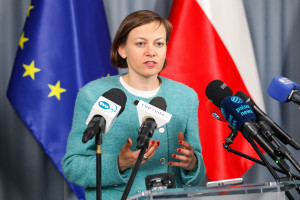Teenager visits psychologist without parental consent. There is a decision of the commission on the project awaited by young people

- The Parliamentary Health Committee has adopted a bill enabling teenagers to use a psychologist’s help without their parents’ consent.
- Although most MPs expressed support for the idea behind the project, doubts also arose: how to provide assistance to a minor without excluding guardians?
- Even though a number of clarification amendments were introduced to the project, there was still a group of MPs who questioned the sense of the changes.
- - This act will really save children's lives, but it will also give them the feeling that they are not alone, that there are people to whom they can turn for support. There are such cases and there are such children who suffer in solitude. This act aims to ensure that children are safe - said the children's rights advocate Monika Horna-Cieślak
The draft amendment to the Act on Patient Rights and the Patient Rights Ombudsman and certain other acts was created at the initiative of young people who indicated that resistance from parents sometimes prevents them from using help in a mental crisis. In cooperation with the Children's Rights Ombudsman and the Sejm's Standing Subcommittee on Mental Health, regulations were prepared that are to introduce such a possibility in specific situations.
It provides that persons over 13 years of age could obtain the necessary help in the event of experiencing a mental crisis, even when it is not possible to obtain the consent of a parent (legal representative) for a consultation with a psychologist, psychotherapist or community therapist as part of guaranteed benefits (i.e. in the public health care system, "on the National Health Fund"). On the other hand, persons who have reached the age of 16 could use such help also when the parent does not consent to it.
Although most MPs expressed support for the idea behind the bill during the first reading (which took place in November last year), doubts also arose: how to provide assistance to a minor without excluding guardians . Therefore, the work in the subcommittee to which the proposed amendment was referred focused on balancing the good of the child and the rights of parents.
Despite the fact that a number of clarification amendments were introduced to the bill, there was still a group of MPs who questioned the sense of the changes. Confederation MPs expressed their incomprehension of such "limitation of parents' rights", although the chairwoman of the Health Committee, Marta Golbik from KO, who also chaired the work of the subcommittee processing the bill, argued - and she was not the only one - that this was to be a response to specific and pathological situations, when young people do not have support and understanding from their loved ones. However, there were voices denying the threat of domestic violence, emphasizing instead the "threat of transition". However, as the chairwoman of the committee argued, the draft act does not allow for such a possibility of children undergoing gender correction without the knowledge of their parents.
The discussion on this topic aroused considerable emotion and prompted the vice-chair of the commission, Joanna Wicha from the Left, to make a personal confession.
- I really can't listen to all these stories about how we will pull Polish children away from a warm, wonderful family environment. Ladies and gentlemen, I would really like all Polish children to live in wonderful families. I have never lived in such a family, I lived in a violent family and I will not agree to us not helping children who have problems. My parents did not care about me and there are many such children in Poland, so we need to take care of them. There are many children who cannot cope with their problems without help - she emphasized.
- This bill will truly save children's lives, but it will also give them the feeling that they are not alone, that there are people they can turn to for support. There are such cases and there are such children who suffer alone. This bill aims to make children simply safe. And I would really like to point out that today's times are difficult for children and for parents who are really trying. So I would really like to ask for a favorable look at this bill. Because it is about children being able to get help quickly - appealed the children's rights advocate Monika Horna-Cieślak.
Psychological help only within the National Health FundDuring the work of the subcommittee, the project was clarified that the child will be able to use this assistance only in the system of guaranteed benefits, at the so-called first reference level in psychiatric care for children and adolescents. MP Golbik explained that it was formulated in this way due to the fact that the profession of psychologist is still unregulated, and the intention of the applicants was to guarantee that the child will be directed to a person who has the appropriate competences. In the current legal state, the way to do this is to limit access to assistance "under the National Health Fund".
Moreover, the draft states that the person providing the service shall immediately notify the parent (legal representative) that such a visit has taken place, as well as the patient's mental health condition, the need to continue providing specific health services. They will be able to waive this obligation only if they consider that its implementation may pose a threat to the patient's well-being.
- So, as a rule, we want to include the family in the treatment system of a young patient, but there may be exceptions in which the person providing the service has the right not to inform the guardian if the child is in direct danger. However, in the event of a threat to the patient's well-being, the entity providing health services notifies the guardianship court - emphasized Marta Golbik.
- These are important provisions regarding the fact that when providing assistance to a minor, family and guardians should not be excluded. We want to adopt a system in which parents are included, i.e. on the one hand, we do not require the consent of a parent when a young person wants to come for help - they will be accepted, but on the other hand, we try to include the family in this situation. And if the person providing assistance realizes that the child is in danger, then they refer the case to the guardianship court - she added.
A visit with a trusted person or is it better without one?The provision concerning the so-called designated/trusted person also stirred up a lot of emotions. The idea is that a young person can visit a psychologist in the company of an adult who is not a parent or guardian. However, it was pointed out that this leaves room for abuse. MPs suggested that such a person should be checked in the register of paedophiles. They asked why introduce such a function, since there are psychologists and pedagogues in schools. PiS MP Patryk Wicher suggested that it may be really difficult for parents to accept that their child uses psychological support without their knowledge and consent, but in the company of another adult. He pointed out that young people in their teens are easily influenced by other people, not always positively.
MP Marcelina Zawisza (Razem) explained that such a person would be a support, "hold your hand" and make it easier to talk about problems. In turn, Monika Horna-Cieślak argued that over 60 thousand young people experiencing a mental crisis who called the Children's Helpline operating at her office (800 12 12 12) last year did not have any adults in their immediate environment with whom they could talk about what was happening.
She also noted that the provisions regarding an accompanying (designated) person are known in Polish law. She cited Article 185a, b and c of the Code of Criminal Procedure, where children who tell about crimes that are committed to their detriment or that they witness, can designate such a person.
Ultimately, at the request of MP Janusz Cieszyński from PiS, the introduction of a trusted person was abandoned. Marta Golbik agreed to this all the more easily because, as she explained, there was no such provision in the original bill, it was introduced only at the subcommittee stage. - However, if it raises such doubts, then I think we could not include the indicated person - she said.
Here, however, the question arose, what if the child wanted to use the help of a psychologist, for example, in the company of the grandmother. The Patient Rights Advocate Bartłomiej Chmielowiec pointed out that the Act on Patient Rights and the Patient Rights Advocate includes a definition of a close person . - It is a spouse, a relative to the second degree or a relative to the second degree in the direct line. Therefore, the grandmother will be a close person in this case who can accompany the child when providing health services - he noted.
MP Józefa Szczurek-Żelazko from PiS asked how a young person, who in principle cannot use medical help on their own, would register for visits to a psychologist. It was decided that this issue requires further clarification before the second reading – it may have to be resolved with special regulations.
Ultimately, the committee accepted the bill with amendments. 16 MPs voted in favor, one was against, and five abstained. The young people present at the meeting applauded this fact.
Since Marta Golbik had previously told Rynek Zdrowia that she wanted the bill to reach Andrzej Duda's desk before Karol Nawrocki replaces him in the Presidential Palace, it can be expected that the second reading of the bill will take place during the session of the Sejm starting on Tuesday.
Copyrighted material - reprint rules are specified in the regulations .
rynekzdrowia







